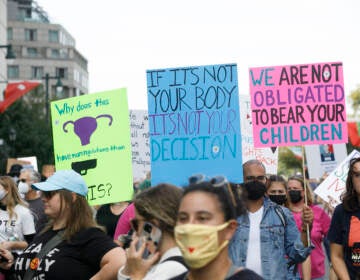Abortion rights hang in the balance, as advocates rally in Philly and across the country

CHEVY CHASE, MARYLAND - SEPTEMBER 13: Pro-choice activists march to the house of U.S, Supreme Court Associate Justice Brett Kavanaugh for a protest September 13, 2021 in Chevy Chase, Maryland. Members of ShutdownDC held a demonstration in support of abortion rights and to protest Supreme Court Associate Justice Brett Kavanaugh. (Photo by Alex Wong/Getty Images)
Abortion-rights advocates are protesting in cities across the U.S. on Saturday, with their movement feeling deeply uneasy about what comes next after Texas enacted the nation’s most restrictive abortion law, and with the conservative Supreme Court possibly ruling on the future of Roe v. Wade during its next term, which starts Monday.
Jess Hale is one of those advocates. They came to Washington, D.C., from Texas this week with other young activists to push for federal abortion protections, and they expressed frustration that activists’ fears about abortion restrictions hadn’t been taken seriously in the recent past.
“We have been saying since the beginning that it does matter, because now we’re seeing the facts,” Hale said. “So it’s like we’ve been trying to get people to pay attention to us, to listen to us, to get involved and to help us fight back.”
HK Gray is an advocate — and former client — of Jane’s Due Process, which helps teenage girls in Texas navigate the abortion process. In addition to advocacy on Capitol Hill, she and her friends will also be marching in Saturday’s Rally for Abortion Justice, which will culminate in front of the Supreme Court.
“I think just like the sheer amount of people that come really makes a statement in itself,” she said. “And it is a protest. I know everyone says, ‘Oh, they don’t really work,’ but they bring the message across. Also, I brought my daughter to one, and I think it’s a really nice experience to, if you have young children, to bring them there and have them be a part of it.”
Women’s March, which organized annual protests during Donald Trump’s presidency, is also helping stage Saturday’s rallies.
“This is a coalition that is gathering under the hashtag ‘Rally for Abortion Justice,’ and Women’s March is playing a particular role inside of that,” said Executive Director Rachel Carmona. “Obviously, we have, as you know, as the Taken movies would say, ‘a specific set of skills,’ and we can stand up a march of this size in four weeks.”
That makes Women’s March one arm of a much bigger strategy for abortion-rights advocates as they figure out how to react to Texas’ SB 8, a law that bans abortions after about six weeks of pregnancy, even while it’s not totally clear to abortion-rights advocates what their best next steps are.
“We really thought we were going to get relief from the Supreme Court with this being so blatantly unconstitutional,” said Marva Sadler, director of clinical services at Whole Woman’s Health in McAllen, Texas. “But what we do next, and exactly what happens next? I don’t know that any of us know that yet.”
For workers at abortion clinics, she said, one basic next step is informing patients of their options when they realize they can’t get abortions in their home state.
“Most of those patients, they leave there not having a formulated plan of what’s next,” she said. “But we try to make sure that they have the resources so that when they can kind of take that breath, they have everything they need to make that choice.”
Abortion-rights advocates in Texas have mobilized to inform patients of their options, as well as to provide funds to help people pay for the procedures. There are legal challenges to the law, and the city of Austin has agreed to “investigate and pursue appropriate legal action in support of current efforts to challenge” SB 8. In the medium and long term, the law may also energize Democrats in upcoming elections, including the 2022 midterms.
But all that work can make stepping back and thinking about the bigger political picture tough. To Aimee Arrambide, executive director of the Texas abortion-rights organization Avow, the Texas law makes it clear that some on the left got complacent and even shy about fighting for abortion rights.
“I think that we’ve allowed abortion stigma to permeate all of progressive actions. People call it ‘women’s health care,’ ‘reproductive health care.’ People won’t use the word ‘abortion,’ ” she said. “Abortion tends to be the rights that get negotiated away when progressives are fighting for issue areas.”
Carmona, from Women’s March, agrees that progressives have not fought hard enough for abortion rights. However, she stresses that abortion-rights opponents are the main force that she and other abortion-rights groups are fighting.
“We also need to recognize these attacks for what they are,” she said. “This needs to be understood in the broader context of attacks on democracy and not just as a niche women’s issue.”
In terms of policies, abortion-rights advocates are going on offense by pushing for new laws like the Women’s Health Protection Act, which passed the U.S. House last week. However, such protections are unlikely to pass in a closely divided Senate.
Meanwhile, abortion-rights advocates also acknowledge that defense against other anti-abortion-rights measures nationwide is a top priority. And eventually, those laws could proliferate much more, depending on how the Supreme Court rules in its next term on a Mississippi law banning abortion after 15 weeks.
The court’s term starts on Monday. Not coincidentally, the Supreme Court is where Saturday’s march in D.C. will end, and it’s where anti-abortion-rights activists hold their own prayer rally on Saturday.
9(MDAzMzI1ODY3MDEyMzkzOTE3NjIxNDg3MQ001))




